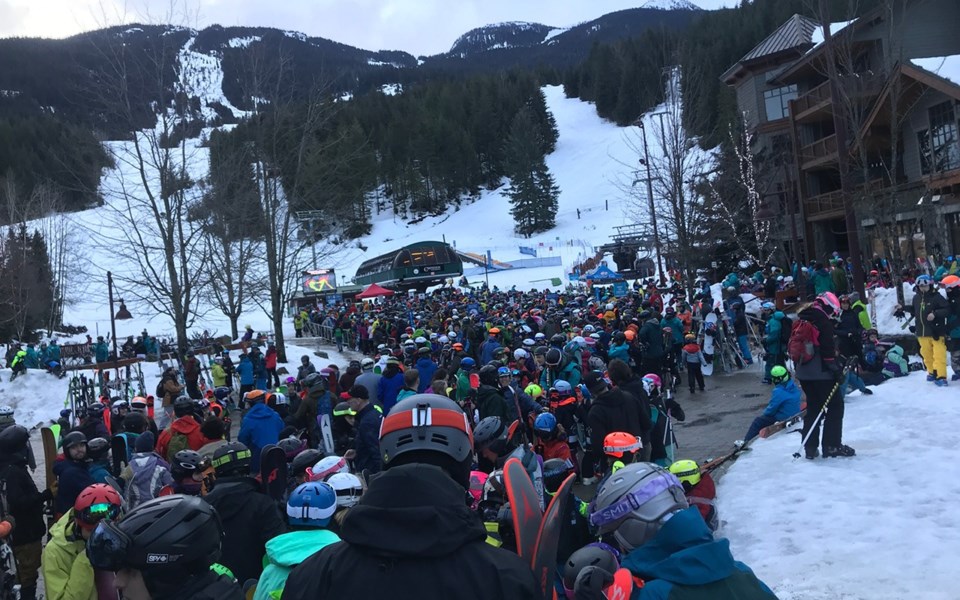While frustration towards Vail Resorts' management of Whistler Blackcomb (WB) is nothing new, a recent petition calling on the resort behemoth to "address the problems they have created by idly neglecting the magic that once defined the unforgettable experience" that is WB appears to be gaining traction.
The change.org petition—titled Vail Resorts: Make Whistler Great Again!—boasted more than 2,200 signatures by Feb. 5, just four days after it started, with a target of 2,500.
According to WB's new COO Geoff Buchheister, the mountain operator has been challenged by a difficult snowpack this year, but is listening to concerns and will make changes where appropriate.
"By no means am I sitting here and saying like, 'hey, look man, everything's perfect,'" said Buchheister. "What I'm actually saying is, 'yes, we're going to listen.'"
Buchheister added that his leadership style is built on listening to employees and guests and continually improving.
"If you're going to have the [goal] that you're going to lead the world in something, then you have to be open and ready to improve every day," he said.
The petition alleges that on-mountain operations (including food and snowmaking) have diminished since Vail Resorts' acquisition of WB in 2016, lift lines are longer, and terrain takes "more and more time to open up."
Doug MacFarlane, WB's vice president of mountain operations, disputes the premise of the petition.
"Vail Resorts expects us to operate these mountains as we have in the past and supports me," he said, speaking specifically about the opening of terrain.
"There's nobody stopping us or asking us to do anything different."
MacFarlane, who has more than three decades of experience working on Whistler and Blackcomb mountains, said that this winter has brought some extremely challenging weather from an operations standpoint, resulting in the slowest opening of alpine terrain that he can remember (mid-January).
Unseasonably warm weather also interrupted snowmaking efforts, he said.
Relatively low snowpack that formed early on in the season was exposed to the elements for a prolonged period of time, resulting in a "persistent weakness" that made it challenging to carry out avalanche control work, MacFarlane explained.
Then, in January, the resort received a glut of snowfall, when 477.8 centimetres fell, beating a previous record of 463 cm in 2005. This resulted in significant avalanche control work, he said.
Adam Mercer, WB's patrol director, said that staff aspires to open all lifts in all zones as soon as possible in the season, and as early as possible in the day.
"That doesn't change year over year," he said.
"That's our objective—to [open] as much terrain to people as safely and as efficiently as possible."
Mercer added that patrol has used around five tonnes of explosives this year, about 60 per cent more than last year.
Another challenge, said Mercer, was that patrol couldn't move through the resort easily early on in the season due to a lack of snow, and then they were burdened during snowy January.
Because of storms, patrol had to rely on distributing bombs by hand, as opposed to by helicopter, he said.
"And when you're moving through deep snow, it slows things down," said Mercer. "When you have to put in 60 per cent more explosive to mitigate the hazard for both our workers and our guests, yeah, it slows down."
Ben Cherniavsky, a part-time Whistler resident who created the petition, said that the response to the "viral" petition has been astonishing and taps into deep-seated frustrations with Vail Resorts.
"This goes well beyond the opening of the terrain," he said, citing concerns about pricing and a lack of grooming and snowmaking.
Cherniavsky added that he thinks that the resort could do a much better job in terms of communicating closures to the public, and that it should look to compensate visitors when the conditions are too poor to enjoy a day on the mountain.
He wants the petition to be a "positive campaign" for the community and mountain operator alike.
"The bottom line is we just want Whistler to be great again," he said. "What made Whistler great was the experience. It's like Disneyland. [It's] all about the attention to detail and experience."
With respect to communicating stormy days and delays, Marc Riddell, communications director for WB, said that Twitter is the best place to find updates.
He added that the resort operator is looking to make some tweaks to its communications around such events going forward.
"Clearly, it's something that we have heard from guests, and it's something that we're looking at," said Riddell. "There's always room for us to improve on [it]."
With a challenging year on the books, Buchheister said that he is grateful for his team's hard work, especially in the lead-up to the busy Christmas period.
"I consider it heroic work, and I appreciate what they've done," he said.
MacFarlane added that while the popularity of the petition can be seen as demoralizing for staff, it wouldn't sway them when it comes to on-mountain safety.
"Even though it is disheartening, there's no way that it will sway our decision [making] when it comes to a safety consideration," he said.
"We're motivated to get these mountains open, and have them run and provide the best experience every single day we possibly can. That's our goal."




